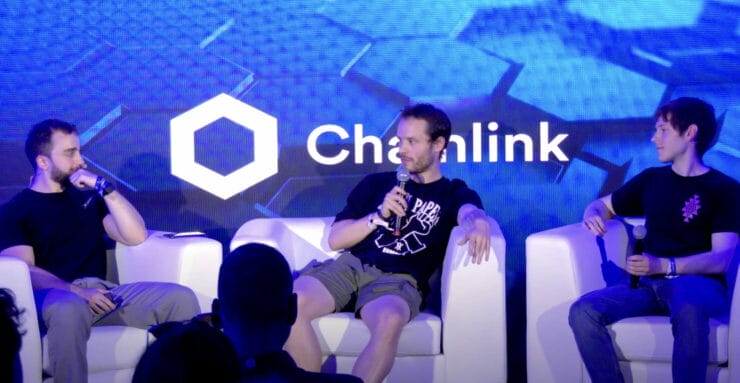Last month during EthCC, Chainlink launched its Cross-Chain Interoperability Protocol (CCIP), on the Ethereum, Optimism, Polygon, and Avalanche blockchains with general access on multiple testnets. Leading DeFi protocols Aave and Synthetix were among the first to integrate CCIP to power cross-chain smart contracts.
During an EthCC panel discussion, Chief Business Officer of Chainlink Labs Johann Eid talked to Synthetix core contributor Daniel B. alongside BGD Labs co-founder and former Aave CTO Ernesto Boado about how Synthetix and Aave are pioneering CCIP-powered use cases that accelerate web3’s broad adoption.
Synthetix’s Synth Teleporters use CCIP, which is secured by the same decentralized oracle network that has already enabled over $8 trillion in transaction value, to facilitate a unique burn-and-mint model for transferring assets between chains without the need for liquidity pools.
“We don’t have that limitation at Synthetix – as long as you have the tokens on the source chain, we can just burn them and mint them on the destination chain,” Daniel B. explained.
“The way we’ve architected the system, we can do mint and burn in a way that users don’t take higher risks, unlocking a ton of innovation and making cross-chain transfers so much more efficient,” Eid added.
Boado explained how third-party cross-chain infrastructure like Chainlink CCIP allows Aave to future-proof its multi-chain governance mechanism as it expands across multiple layer-1 and layer-2 networks.
“We can add some level of abstraction to be able to fully control every deployment of Aave with on-chain governance, which is the ideal of decentralization,” he said.
Eid believes Aave’s CCIP-enabled governance model is essential for a growing number of protocols deployed across multiple chains. He highlighted how CCIP achieves a “unified view of any protocol” no matter which chains it’s deployed on.
“If I deploy Aave on ten different chains, I have the same rules on these ten different chains; I have a unified state of my protocol,” Eid explained. “If I go on Avalanche and I use Aave and then I go on Polygon and I use the same protocol, I do expect the same rules to be applied, and that’s really critical for user adoption.”
Boado underscored why Chainlink’s secure infrastructure is paramount to DeFi’s long-term success.
“Without security, there is no permanent DeFi, there is no selling of the idea of the blockchain for the outside world,” he explained. Likewise, secure cross-chain communication is “completely fundamental” for protocols, like Aave, which secure billions of dollars across multiple chains.
“The role of CCIP is completely central in the system,” Boado said.
Watch the full panel discussion.


